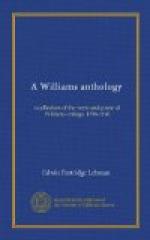When a class-mate late in life found repose in the Roman church, Dr. Hall could see and say that such anchorage was best for his friend. All paths that led to trust in God and the strengthening of the essentials of character were allowable in the brotherhood of the service of humanity.
The world of scholarship has its arrogancies—sometimes it is critical over-much, intolerant toward the lesser requirements of busy men outside. This man never lost touch with men as they passed. His own assurance of belief was a flame which lighted many torches. It was a sane and a glad evangel that he gave to his students, and brought in almost constant and always ardent addresses to the youth of many colleges.
Intellectual integrity was joined in him with the finest spiritual apprehension and expression, so that he was qualified to carry a message to the cultivated of India, where he got his mortal hurt. In the knightly loyalty with which he labored his zeal was a highly tempered blade. He respected all faiths, but an abiding assurance of the supremacy of the service of Christ gave him unwavering serenity and poise. It is easy to think of Charles Cuthbert Hall entering the Supreme Presence reverently, unafraid, rejoicing, as naturally as a child would come home.
IX. BLISS PERRY
CARROLL LEWIS MAXCY ’87
The subject of this brief sketch may indeed be termed a Williams man both by heredity and by environment. He passed his boyhood and early youth under the very shadow of our hills; and his father, Professor A.L. Perry, was for years the most widely known as well as the most generally loved of its faculty.
Bliss Perry was born in 1860; after graduation, in 1881, he became instructor in English and elocution at his alma mater and in 1886 was advanced to the full professorship. In 1893 he accepted a call to the same chair at Princeton. Six years later he was appointed to the editorship of the Atlantic Monthly, thus becoming one of a famous line of editors including Lowell, Howells, and Aldrich. He remained at the head of the Atlantic for just ten years, resigning in August 1909 to devote himself wholly to the duties of the chair of English literature at Harvard, which he had accepted two years before and which had already been filled by Longfellow and Lowell. The year 1909-1910 he spent abroad as Hyde lecturer at the Sorbonne.
Professor Perry’s publications extend over the fields of fiction, criticism, and the occasional essay. His Study of Prose Fiction, a clear exposition of narrative writing, is one of the best-known college textbooks on the subject. His Walt Whitman is without doubt his most careful and elaborate critical work and is a recognized authority. The Amateur Spirit, a series of familiar essays, shows Professor Perry at his best and should be read especially by those who delight to study the personality of an author as revealed in his work.




